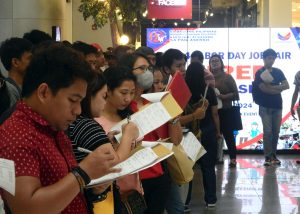The Commission on Audit (COA) has ordered the city government to improve its background checks on applicants of its loan programs.
The audit agency added the city government must compel its grantee organizations to pay their obligations.
This, after the agency was able to find loans receivables of up to P37.2 million that were not settled as of December 31, 2018.
These were loan assistance that were granted to various associations and individuals in the city.
This was a part of the independent body’s check of the city’s compliance of laws and its books for 2018.
According to the COA, the city government needs to require a co-maker or collateral for future loan applications, as well as issue sanctions for erring associations or borrowers.
The COA has also asked the city government to “evaluate the status of the outstanding receivables.”
The audit agency has also said the city government should consider write-offs for outstanding balances, in case the city could no longer collect the said amounts.
The audit agency said that the amount casted doubt on the reliability and accuracy of the receivable balance, since some of the beneficiaries no longer exist.
The COA lauded the city’s strategy to help out in terms of livelihood projects for its constituents, in this case the loan program.
“The CGD has continually initiated strategies to improve the lives of its constituents. Various programs including housing and livelihood programs were implemented in its desire to reduce poverty especially for underprivileged citizens and marginalized people,” the COA said.
“Opportunities and livelihood programs were also extended to support the development of small and micro-enterprises by commencing special programs to reach vulnerable groups.”
“Along this line, however, the following overdue loans receivable arising from assistance to associations and individuals amounting to P37.2 million had remained outstanding as at year-end,” the COA said.
The loans, according to the COA report, were granted to three programs, namely the Urban Land Reform Program (URLP), Self-Employment Assistance Kabuhayan/Kaunlaran (SEA-K), and Micro Credit Assistance-Fisherfolk Development Program (MCA-FDP) in amounts of P19.9 million, P15.1 million, and P2.182 million, respectively
The URLP, according to a backgrounder in the COA report, involves the implementation of the Urban Development and Housing Act (UDHA) as an housing assistance for poor citizens.
The city government has granted these loans to community and homeowner’s associations, with loan agreements determining the payment method and period of payments.
The agreement includes penalties of P50.00 per month of delay of the monthly loan payment, with penalties including the right to foreclose the mortgage contract.
“It appears, however, that the… terms and conditions were not complied with respect to loan repayments. We observed a delay in recording loans released for about a year or more as compared with the CHHD records.
Consequently, the scheduled loan repayment was not followed,” the COA said, referring to records of the City Housing and Homesite Division.
“Review of accounting records showed that the URLP has a balance of P26.7 million… as at December 31, 2018, and 54% or P14,4 million were long overdue.”
The payment delays ranged from 710 days to 7,108 days, under the URLP alone.
Meanwhile, the COA also found that several homeowners associations such as the Bolton Bridge Homeowners Association did not pay its loan of P2.835 million, with the city already filing a case against the association and awaiting the court decision.
“There was also suspension of payment from the United Bucana Lasang Homeowners Association, paying only P93,750.00 out of P2,250,000.00 loan, pending the outcome of the case filed by the Association against the illegal occupants in the area. The members have not occupied the area because of the presence of the illegal settlers. The loan term will mature on March 2022,” the COA report said.
According to the report, there were loan beneficiaries who refused to pay their monthly installments, while there were other members who did live in the area, which led to low collection.
The COA report indicated that both the city government and the presidents of the associations were “reluctant to impose penalty or to cancel the lease agreement of defaulting members.”
The audit agency said that the city would have earned around P5.5 million had it been strict with collections.
Meanwhile, the city’s Self-Employment Assistance Kabuhayan/Kaunlaran (SEA-K) also yielded similar delays in payment.
The COA said that 50% of the borrowers did not pay their loans within the period of one to two years.
Under the program, the city government should have collected at least P15 million in loan payments for loans of P5,000 to P10,000 for qualified borrowers.
There were some grantees who understood the term “grant” as something that they did not have to repay, the COA said. Some, meanwhile, did not have sustained business operations after the loan.
Some associations were “disbanded due to various reasons including malversation of funds.”
The assistance to fisherfolk, meanwhile, had receivables totaling P2.182 million as of December 31, 2018, with the program distributed through the City Agriculturist’s Office.
“A letter was sent to the Accounting Office requesting for the status of the loans receivable. The recorded balances showed that the assistance was granted in CY 2007 when the electronic National Government Accounting Systerm (e-NGAS) was adopted by the CGD,” the COA said.
“However, it was gathered that the actual release was made prior to CY 2007 and the balances were carried forward based on subsidiary ledgers only with no available source documents to substantiate. With this predicament, validity and propriety of reported book balance cannot be determined.”
The City Government, in its response to the COA, said that it had sent out verification letters as early as January 2018 regarding the status of the accounts.
Eighty out of 98 letters were received, while the other 18 associations or individuals could not be located.
Meanwhile, the CSSDO acknowledged the COA recommendations and vowed to reconcile its records.
The City Accounting Office said it was regularly furnishing the City Planning and Development Office with a list of items for reconciliation.
The CPDO, for its part “has sent notices to the program beneficiaries and will coordinate with the concerned national agencies to determine if the associations with outstanding balances are still operating.”


